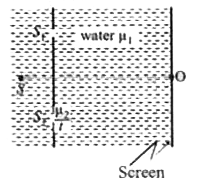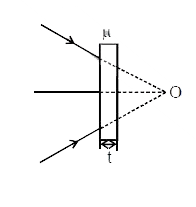When a transparent parallel plate of uniform thickness t and refractive index μ is interposed normally in the path of a beam of light, the optical path is
μt
μ/t
(μ−1)t
None of these
The correct Answer is:A
Step by step video, text & image solution for When a transparent parallel plate of uniform thickness t and refractive index mu is interposed normally in the path of a beam of light, the optical path is by Physics experts to help you in doubts & scoring excellent marks in Class 12 exams.
Updated on:21/07/2023Topper's Solved these Questions
- WAVE OPTICSBOOK - PHYSICS GALAXY - ASHISH ARORACHAPTER - WAVE OPTICSEXERCISE - Numerical MCQs Single Options Correct
49 Videos
- WAVE OPTICSBOOK - PHYSICS GALAXY - ASHISH ARORACHAPTER - WAVE OPTICSEXERCISE - Advance MCQs with One or More Options Correct
27 Videos
- WAVE OPTICSBOOK - PHYSICS GALAXY - ASHISH ARORACHAPTER - WAVE OPTICSEXERCISE - Discussion Question
20 Videos
- THERMODYNAMICS LAWS & SPECIFIC HEATS OF GASES BOOK - PHYSICS GALAXY - ASHISH ARORACHAPTER - THERMODYNAMICS LAWS & SPECIFIC HEATS OF GASES EXERCISE - Practice Exercise 3.4
11 Videos
- WAVES BOOK - PHYSICS GALAXY - ASHISH ARORACHAPTER - WAVES EXERCISE - Unsolved Numerical Problems for Preparation of NSE, INPhO & IPhO
135 Videos
Similar Questions
Interference pattern with Young's double slits 1.5mm apart are formed on a screen at a distance 1.5m from the plane of slits. In the path of the beam of one of the slits, a transparent film of 10 micron thickness and of refractive index 1.6 is interposed while in the path of the beam from the older slit a transparent film of 15 micron thickness and of refractive index 1.2 is interposed. Find the displacement of the fringe patten.
View SolutionA YDSE is conducted in water (μ1) as shown in figure. A glass plate of thickness t and refractive index μ2 is placed in the path of S2. The optical path difference at O is

View Solution
Knowledge Check
When a thin transparent plate of thickness t and refractive index μ is placed in the path of one the two interfering waves of light, then the path difference changes by
A(μ+1)tB(μ−1)tC(μ+1)tD(μ−1)tA beam of light is converging towards a point. A plane parallel plate of glass of thickness t, refractive index is introduced in the path of the beam. The convergent point is shifted by (assume near normal incidence) :
 At(1−1μ)Bt(1+1μ)CnearerDaway
At(1−1μ)Bt(1+1μ)CnearerDawayA ray of light from a monochromatic point source of light is incident at a point on the screen. If a thin mica film of thickness t annd refractive index n is introduced in its path, then the optical path
Ais increased by (n-1)tBis decreased by (n-1) tCis not affectedDis increased by (n+1)t
Light travels through a glass plate of thickness t and refractive index μ. If c is the speed of light in vacuum, the time taken by light to travel this thickness of glass is
View SolutionA thin perfectly transparent glass sheet of thickness t and refractive index mu is pasted on one of the two identical slits. If the intensity of light at the centre of the screen is I0 in the absence of glass sheet, the intensity at O as a function of thickness of the glass plate is
View SolutionLight travels through a glass plate of thickness t and refractive index μ. If c is the velocity of light in vaccum, the time taken by the light to travel this thickness of glass is
View SolutionA transparent slab of thickness t and refractive index μ is inserted in front of upper of YDSE apparauts. The wavelength of ligth used. is λ. Assume that there is no absorption of light by the slab. Mark the correct statement(s).
View SolutionA double slit experiment is performed with light of wavelength 500 nm A thin film of thickness 2 μm and refractive index 1.5 is introduced in the path of the upper beam the location of the central maximum will
View Solution
